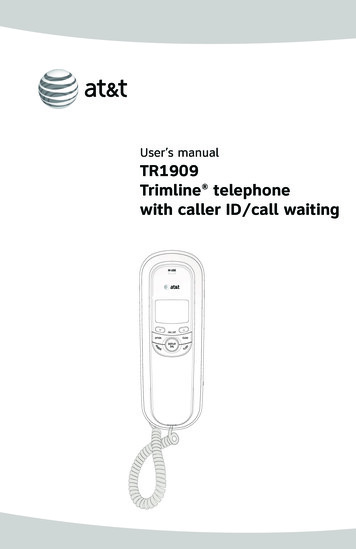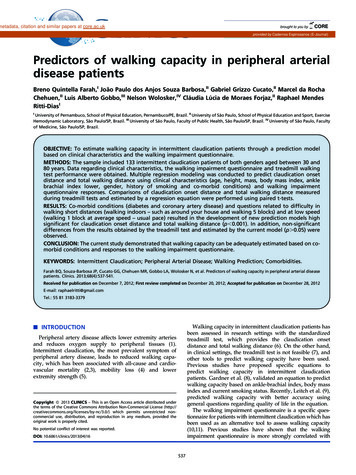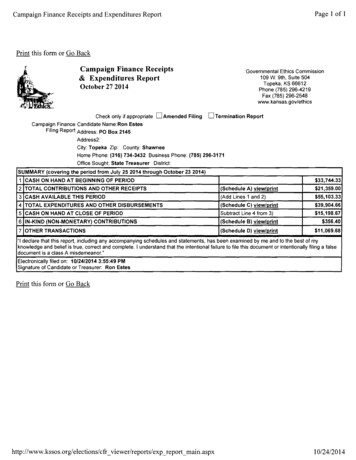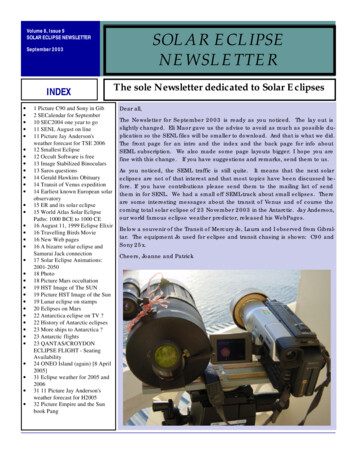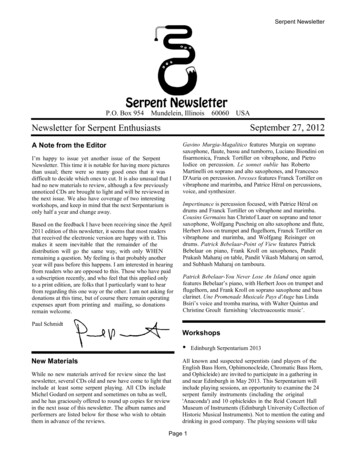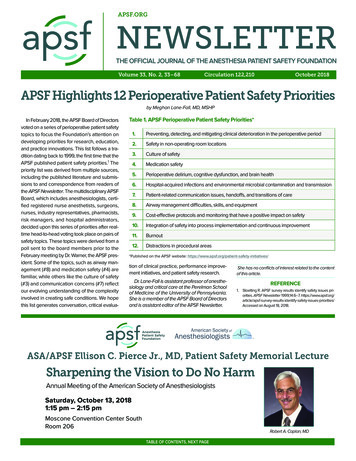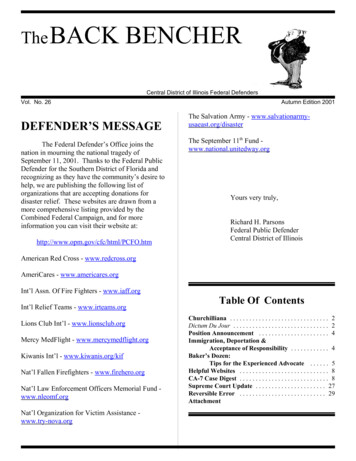
Transcription
The BACKBENCHERCentral District of Illinois Federal DefendersVol. No. 26DEFENDER’S MESSAGEThe Federal Defender’s Office joins thenation in mourning the national tragedy ofSeptember 11, 2001. Thanks to the Federal PublicDefender for the Southern District of Florida andrecognizing as they have the community’s desire tohelp, we are publishing the following list oforganizations that are accepting donations fordisaster relief. These websites are drawn from amore comprehensive listing provided by theCombined Federal Campaign, and for moreinformation you can visit their website at:http://www.opm.gov/cfc/html/PCFO.htmAutumn Edition 2001The Salvation Army - www.salvationarmyusaeast.org/disasterThe September 11th Fund www.national.unitedway.orgYours very truly,Richard H. ParsonsFederal Public DefenderCentral District of IllinoisAmerican Red Cross - www.redcross.orgAmeriCares - www.americares.orgInt’l Assn. Of Fire Fighters - www.iaff.orgInt’l Relief Teams - www.irteams.orgLions Club Int’l - www.lionsclub.orgMercy MedFlight - www.mercymedflight.orgKiwanis Int’l - www.kiwanis.org/kifNat’l Fallen Firefighters - www.firehero.orgNat’l Law Enforcement Officers Memorial Fund www.nleomf.orgNat’l Organization for Victim Assistance www.try-nova.orgTable Of ContentsChurchilliana . . . . . . . . . . . . . . . . . . . . . . . . . . . . . . . 2Dictum Du Jour . . . . . . . . . . . . . . . . . . . . . . . . . . . . . . 2Position Announcement . . . . . . . . . . . . . . . . . . . . . . 4Immigration, Deportation &Acceptance of Responsibility . . . . . . . . . . . . 4Baker’s Dozen:Tips for the Experienced Advocate . . . . . . 5Helpful Websites . . . . . . . . . . . . . . . . . . . . . . . . . . . . 8CA-7 Case Digest . . . . . . . . . . . . . . . . . . . . . . . . . . . . 8Supreme Court Update . . . . . . . . . . . . . . . . . . . . . . 27Reversible Error . . . . . . . . . . . . . . . . . . . . . . . . . . . 29Attachment
P 2 Autumn Edition 2001The BACK BENCHERfaithful service in this war but whosenames will never be known, whosedeeds will never be recorded. This isa war of the unknown warriors; butlet us strive without failing in faith orin duty, and the dark curse of Hitlerwill ever be lifted from our age.”“Give me my books, my golf clubsand leisure, and I would ask fornothing more. My ideal in life is toread a lot, write a little, play plentyof golf and have nothing to worryabout.”- J.A. BalfourDictum Du JourCHURCHILLIANAWe usually use this space for someof Winston’s witticisms. However,in these trying times I felt thefollowing message was moreappropriate.Churchill made this June 1940 radiobroadcast on the BBC. It was anaddress to rally Londoners as theywere being subjected to nightlybombings while they awaited theexpected German invasion fromacross the Channel. If one imaginesour country in 2001 and substitutesbin Laden for Hitler, the message isstill strong and applicable to thisvery day.(The Editor)“Here is the strong City ofRefuge, which enshrines the titledeeds of human progress and is ofdeep consequence to Christiancivilisation.{W}e awaitundismayed the impending assault.Perhaps it will come tonight.Perhaps it will come next week.Perhaps it will never come. Wemust show ourselves equally capableof meeting a sudden violent shock or(what is perhaps a harder test) aprotracted vigil. But be the ordealsharp, or long, or both, we shall seekno terms, we shall tolerate no parley.We may show mercy — we shall askfor none.This is no war of chieftainsor of princes, of dynasties ornational ambition. It is a war ofpeople and of causes. There are vastnumbers not only on this island, butin every land who will render“When I despair, I remember that allthrough history the way of truth andlove has won. There have beentyrants and murderers and for a timethey seem invincible, but in the end,they always fall - think of it,ALWAYS.”- Mahatma Ghandi**********“It’s nice to be important, but it’smore important to be nice.”- “Tip” O’Neal (D.Mass.)Former Speaker of the House**********“I have a lot left. I love what I do.As long as the passion is there, I’ll bearound for years.”- Lance Armstrong(after winning his third straight Tourde France championship ANDsurviving life-threatening cancer.)**********“Secrets are like meat; they can befrozen or eaten but not kept.”- Jim Lehrer, Blue Hearts**********If you would sup with the Devil, youmust bring a long spoon.- English proverb**********Never believe anything until it’sofficially denied.- Jim Hacker in Yes, Minister**********No mean person may keep agreyhound.- Statute enacted during thereign of King Canute**********I asked her if she had any guns,dope, bombs, nuclear devices ordead bodies in the car.Shereassured me there was none. Iasked “Would you mind if I look?”She replied “No, go ahead.” I said“Okay, then?” She reiterated “Goahead.”Excerpt from report ofSpringfield, Illinois police officer (amotion to suppress was filed).********************A friend is someone who understandsyour past, believes in your future, andaccepts you today just the way youare.In times like these, when the publicmind is agitated. . . . .it is the duty ofa court to be peculiarly watchful lestthe public feeling should reach theseat of justice, and therebyprecedents be established which maybecome the ready tools of faction intimes more disastrous. The worst ofprecedents may be established from- Proverbs 27:17**********
P 3 Autumn Edition 2001the best of motives. We ought to beon our guard lest our zeal for publicinterest lead us to overstep thebounds of the law and theConstitution: for although we maybring one criminal to punishment,we may furnish the means by whicha hundred innocent persons maysuffer.The Constitution was made for timesof commotion. In the calm of peaceand prosperity there is seldom greatinjustice. Dangerous precedentsoccur in dangerous times. It thenbecomes the duty of the judiciarycalmly to poise the scales of justice,unmoved by the arm of power,undisturbed by the clamor of themultitude.In Re Byrd, 2001 WL1230314, slip op. (6th Cir., Sept.,2001) (Jones, J., concurring inOrder extending the Stay ofExecution) (quoting Dissent ofJudge Cranch in an unnamed case).**********FBI Special Agent Hadawaytestified that he was not sure whyOfficer Kotowicz drew her pistol,and that she was only two to threefeet from Leon when she did. As towhere it was pointed, AgentHadaway understandably had a vividmemory as, he explained, her gunwas pointed at him. He describedher gun as “a little bit larger thanaverage,” larger than the .357Magnum he normally carried. Thereapparently was no reason for anyoneto have been concerned, as OfficerKotowicz testified that she drew her.38 caliber pistol for only aboutthirty seconds to a minute, and thatshe had it pointed at the ground thewhole time, never at Leon or anyoneelse. She added, however, that shesaw two other committee members,both FBI agents, draw their guns,which somehow escaped the noticeof the other testifying officers. Inany event, no one got shot.United States v. RichardThe BACK BENCHERW. Novak, 870 F.2d 1345, 1347 (7thCir. 1989).2001)(dismissing appeal in light ofappeal waiver in plea agreement).********************In cases like the present one, thequestion is whether defense counselhad access to Brady materialcontained in a witness’ head.Because mind-reading is beyond theabilities of even the most diligentattorney, such material simply cannotbe considered available in the sameway as a document. But the positionthe state advances would require adefense witness’ knowledge to betreated exactly as information in adocument the defense possesses.This stretches the concept ofreasonable diligence too far.[T]his was not a quick “grab andrelease” wedgie, a childhood prankbetween friends that even the courtremembers.Boss v. Pierce, 263 F.3d 734,741 (7th Cir. 2001).**********Although Bradshaw says that she wasintoxicated, she also says that shedrank only two beers. The recorddoes not disclose the brand. Too bad.United States v. Jackson, 177F.3d 628, 631 (7th Cir. 1999).**********The evidence of his guilt of the othercounts was overwhelming; a baker’sdozen of lawyers could not havegotten him an acquittal on thosecounts.United States v. Oreye, 263F.3d 669, 671 (7th Cir. 2001).**********“Defendants who appeal fromsentences following plea agreementsalways point to unanticipated andunwelcome developments.” [UnitedStates v Woolley, 123 F.3d 627, 637(7th Cir. 1997).] This case is nodifferent.UnitedStatesv.Matchopatow, 259 F.3d 847 (7th Cir.Ulichny v. MertonCommunity School District, 249F.3d 686, 691 (7th Cir. 2001).**********Even when a lawyer tries to misleadjurors about the significance of howmany witnesses have testified,Instruction 1.09 leaves something tobe desired: reasons. It tells thejurors that they “may” do one thingand “need not” do the opposite, butthat just states the obvious. Ofcourse jurors “may” findthetestimony of a single witness morepersuasive. Any juror who did notthink that to begin with is unfit toserve. . The underlying principle isthat quality should govern theverdict; ten weasels are no morepersuasive than one. That’s athought that district judges couldconvey directly–though again thepoint is obvious, so usually it is bestleft to the jurors’ good sense. Whyinsult the jurors’ intelligence?U.S. v. Hill, 252 F.3d 919,922 (7th Cir. 2001).**********In or out of the criminal justicesystem, people freely assume risksthat they do not fully understand.Anyone who chooses a profession ora spouse, or decides to havechildren, takes chances subject tomore variables than the mind canjuggle. Yet we do not call thesedecisions unintelligent; venturinginto the unknown with a sketchyidea of what lies ahead may be thewisest choice even when the oddsare beyond calculation.
P 4 Autumn Edition 2001U.S. v. Hill, 252 F.3d 919,928 (7th Cir. 2001).**********Up until the time of his conviction,Brian Lea was an entrepreneurdealing in animal remains. Leaowned and operated a mink ranch,an enterprise that sold meat toalligator farms and greyhoundkennels, a deadstock pickup andremoval business, an animal hidebusiness, and a trucking business totransport his products. Lea also hadconcerns unrelated to animalcarcasses, including a strawberrybusiness. From 1991 through 1996,Lea had various dealings with NBP,a national corporation involved inthe rendering business.NBPproduced animal food and feedadditives in the form of liquid fatand dry meat meal by processingotherwise wasted materials such asused restaurant grease, deadstock,and unused material from meatpacking plants (“offal”). Lea andNBP developed a symbioticrelationship, whereby Lea sold hisdeadstock to NBP’s Berlin,Wisconsin plant, and in return wasleased space at that location toprocess his chicken offal into minkfood.In order to recoup the raw materialslost by Leas’s actions, NBP createdits own deadstock collectionsbusiness.NBP aggressivelycompeted with Lea for deadstock[including] paying for deadstock–afrowned-upon tactic in the deadstockremoval field.United States v. Lea, 249F.3d 632, 635 (7th Cir. 2001).POSITIONANNOUNCEMENTThe BACK BENCHERDue to Assistant Federal DefenderIvan Davis’ decision to move closerto his family, he will be leaving ouroffice in the Central District ofIllinois for a similar position with theFederal Defender for the EasternDistrict of Virginia. All of us whohave been privileged to work withIvan since he started with the officewill miss his contribution to our team.We are glad, however, that he willstill be defending the indigent citizenaccused in Virginia, where his clientsin that district will no doubt benefitgreatly from his professionalism,legal acumen, and congenialpersonality.If you or someone you know areinterested in stepping into Ivan’sshoes, please see the PositionAnnouncement attached at the end ofthis newsletter. As the announcementstates, the position is opened untilfilled and subject to the availability offunding. We are an equal opportunityemployer, and women and minoritiesare encouraged to apply.Immigration,Deportation andAcceptance ofResponsibilityBy: David MoteDeputy Chief Federal DefenderAfter the terrible events ofSeptember 11, 2001, many peoplehave called for a review of ourimmigration policies. Any systemas complex as our immigrationlaws could be improved througha thoughtful process of reviewand modification. We shouldkeep in mind, of course, that “badfacts make bad law” and inSeptember, the facts were verybad.Thus, it is especiallyimportant to resist overhaulingthe legal system based on theemotions of the moment.One topic discussed on the newsshows has been our screening, orlack of screening, of the peopleentering this country fromforeign lands. That issue needsto be addressed. The Statue ofLiberty has an inscriptioninviting other countries to giveus their poor; it does not invitethem to give us their criminals.A criminal conviction can bars om eone from obtainin gadmittance to this country. If animmigrant is in the countrylegally, a criminal convictionmay make them deportable. Inthe case of an adult who comesto this country and embarks on alife of crime, it is appropriate torescind our welcome. Those whoare deported and reenter withoutpermission face serious criminalpenalties. Unfortunately, the lawdoes not currently limitdeportation following a criminalconviction to aliens who comehere as adults.In United States v. Lipman, 133F.3d 726 (9th Cir. 1998), thedefendant had been brought tothis country by his mother at theage of twelve. He attendedpublic schools in New Yorkthrough high school and marrieda U.S. citizen with whom he hadfive children. His mother andsiblings are U.S. citizens. At theage of thirty-five, Lipman wasdeported after being convicted ofseveral offenses. After it wasdiscovered that he was back inthe country, probably because ofthe fact he had been arrested foranother offense, he was chargedwith the federal offense ofunlawful reentry afterdeportation. He was sentencedto twenty-one months. After hissentenced was served, he wouldagain be deported.
P 5 Autumn Edition 2001In United States v. Pacheco, 225F.3d 148 (2nd Cir. 2000), thedefendant was admitted to theUnited States as a permanentresident at the age of six.Between the ages of twenty andtwenty-seven, he was convictedof numerous misdemeanors andsubsequently deported. Whenhe was caught attempting toreenter the United States, he wascharged with illegal reentry. Inthe Never-Never land ofimmigration, some of hismisdemeanors qualified as“aggravated felonies” forimmigration purposes, and hereceived a sentence of forty-sixmonths. After service of hissentence, he will be deportedagain.Our office’s experience withsimilar cases includes twodefendants with Americanfathers and non-citizen mothers.In such cases, if the parents arenot married, citizenship is notautomatic for the child. One wasborn in Nuevo Laredo, Mexico.His mother was living with hisfather in Texas at the time, buthad gone back across the borderfor a day of shopping when hemade his early arrival into thisworld. His sister was born a yearlater in Laredo, Texas, makingher a U.S. citizen. He married aU.S. citizen with whom he hasthree children. After a felonyconviction, he was deported. Hisillegal reentry earned him asentence in excess of six years.Another was born in Thailand.His father was an Americansoldier, but the parents nevermarried. Before he reached agetwo, his mother immigrated withhim to the United States. As ayoung man, he was convicted ofa federal drug offense andreceived a ten-year sentence.The BACK BENCHERUpon his release, he will bedeported to Thailand where hedoes not speak the language orknow anyone.Assuming for the moment thatthese individuals would continueto be a burden on society whenthey are released from prison, andthat the hardship theirdeportation causes to theirfamilies in this country is lessi m p o rt a n t t h a n r e l i e v i n gourselves of that burden, otherquestions remain.Whosecriminals are they?If it isreasonable for us to refuse toaccept criminals from othercountries into our own, is itappropriate for us to deport ourcriminals to other countries?When someone legallyimmigrates to our country beforehe is old enough to talk, lives inour communities, is educated inour public schools, grows up inour culture, and turns out to be acriminal, isn’t he our criminal?And if we accept responsibility forthat criminal as a product of oursociety, should we impose theburden of that criminal on thecountry where the personhappened to be born? Clearly, ifthe criminal has no family in thecountry where he was born anddoes not speak the language, hischance of becoming a productivecitizen of that country is minimal.In re-examining our immigrationlaws, we should review not onlywhether we should change therules on whom we allow into ourcountry, but also whether weshould change the rules on whomwe deportto othercountries.Baker's Dozen:Tips for theExperienced AdvocateBy: Alan EllisCriminal Justice, Winter 1997With 85% of all indicted federalcriminal defendants being convicted,and 85% of these pleading guilty,according to statistics from theAdministrative Office of the U.S.Courts, the most pressing questionsyour client will have are:"How much time am I going to do?"and, "Where am I going to do it?"The following baker's dozen ofsentencing tips suggest how to getyour client the lowest possiblesentence at the best possible place.1. Remember the safetyvalve provisions of the Crime Bill.(18 U.S.C. §3553(f) and U.S.S.G.5C1 .2.) Under appropriatecircumstances, without the necessityof the government filing a 5K1.1motion, a defendant may receive asentence below the mandatoryminimum. Also, if the defendantmeets the criteria for the safety valveand his or her offense level isdetermined to be 26 or greater, it isdecreased by two levels. (U.S.S.G.§2D1.1(b)(4).)2. Accompany your client tohis or her meetings with theprobation officer during thepreparation of the PresentenceInvestigation Report (PSI) stage.Probation officers are oftenoverburdened, so obtain in advancethe forms they need filled out andthe documents they need producedand have your client complete andbring them with him or her to theinitial interview. If you have anycases supporting your position
P 6 Autumn Edition 2001regarding anticipated disputed issuesin the guidelines, bring the casesThe BACK BENCHERwith you and highlight the relevantsections. Remember, probationofficers are not lawyers and oftenhave a difficult time with memorandaof law. Highlighted cases are morehelpful to them.3. When you meet with theprobation officer, find out what his orher "dictation date" is. This is the dateby which he or she must dictate thefirst draft of the PSI. When possible,it is extremely helpful to have theprobation officer and the AssistantU.S. Attorney (AUSA) buy into whatyou believe is your client's offensebehavior, his or her role in theoffense, and any grounds fordownward departure before thedictation. Obviously, "buying in"does not mean paying anybody off. Itsimply means getting them to agreethat your position is not unreasonable.Remember that probation officersoften have a proprietary interest intheir originaldraft PSI, and getting them to changeit through making objections is oftenvery difficult. Hence, you want thebest draft PSI you can get so youdon't have to file that manyobjections.4. If your client is acooperating witness, accompany himor her to any debriefings in casethere's a later dispute as to what theclient said. Also your presence willoften facilitate the discussions,particularly if you've debriefed andprepped your client in advance.5. Before doing any of this,hire a sentencing specialist if yourclient can afford it. These people areoften social workers, former U.S.probation officers, and othercriminologists. They are able tointerview a criminal defendant andget information that lawyers are notnecessarily trained to do. Forexample, a forensic social workerwith a background in psychiatricsocial work is able to identify mentalillness, which will give you groundsfor a downward departure based ondiminished capacity, and uniquefamily circumstances, which giveyou grounds for departure based on"extraordinaryfamilycircumstances." If you need areferral to a sentencing specialist,contact the author at 34 IssaquahDock, Waldo Point Harbor,Sausalito, California 94965 (fax:415/332-1416), or the NationalAssociation o f Sen ten cingAdvocates (202/628-2820), whichhas a listing of over 200 sentencingspecialists throughout the country.Such a specialist is more importantthan ever in guideline sentencingnow that there is less informationdevoted to a defendant's personalcharacteristics and no evaluation asto why he or she committed theoffense. Judges always want toknow why a defendant committed aparticular offense. Giving him or herthe answer to the "why" questionthrough your sentencing specialistgoes a long way towards getting thelowest possible sentence.6. File a presentencememorandum five to seven daysprior to sentencing. Statistics showthat in 80% of the cases, judgescome to the bench with their mindsmade up as to what sentence theywill impose. This is called a"tentative sentence." Unless you canput on a tremendous dog-and-ponyshow at sentencing, it is likely thatyour client is going to receive thatsentence. Consequently, if you canget a solid presentence memorandumwith character letters to the judgebefore a decision has been made,your sentencing specialist's report(or your own cannibalized version)will go a long way in helping thejudge determine a sentence before heor she has crystallized his or herthoughts on the case.7. Many clients ask mewhether they're entitled to credit fortime served while on bail underconditions of home confinement.The answer is no. However, if thecourt orders your client officially
P 7 Autumn Edition 2001detained and then simplyrecommends to the U.S. Marshalthat he or she be kept under homeconfinement, this qualifies as officialdetention. The client will get creditfor time served even though theplace of confinement may be a homeor even the Ritz.8. While a single mitigatingfactor may not warrant a downwarddeparture, a combination of thesefactors, taken together, maypersuade the court otherwise.(United States v. Cook, 938 F.2d149 (9th Cir. 1991); U.S.S.G.§5K2.0 Commentary.) Even if youdon't get a downward departure,these mitigating factors can oftenhelp in getting a sentence at the lowend of the guideline range. This isparticularly important when theoffense level and/or the criminalhistory score render high guidelines.9. Let's face it, when yourclient enters a guilty plea, absent abinding stipulation as to his or herguidelines, the client has no ideawhat the range will be and whatsentence will be received within,below, or above it. Consequently,more and more sentencingauthorities are recognizing the needfor a pre-plea PSI and even asettlement conference before amagistrate unrelated to the case inorder to get a third party's view as tothe base offense level, and whetherthere'll be upward or downwardadjustments or departures. It's alsohelpful, in some cases, to see whatthe magistrate would recommend ifhe or she were the sentencing judge.Currently, both the Southern Districtof Alabama in Mobile and theDistrict of Arizona in Phoenix andTucson are utilizing a variation ofthis p ro ced ure. For moreinformation, contact the probationoffices in those cities. In short, ifyou request and are granted apre-plea PSI, your client will have apretty good idea as to what he or shefaces at sentencing and can thenmake a realistic, intelligent, andThe BACK BENCHERvoluntary decision as to whether toenter a guilty plea.10. Let judges be judges.Koon has altered the ground rules fordownward departure giving defenselawyers and judges more latitude.Indeed, in a recent case by the FifthCircuit upholding the downwarddeparture, the court stated:“Our conclusion that thedistrict court's sentence should not bedisturbed is all the more buttressed bythe recent Supreme Court case ofKoon v. United States,which emphasized in the strongestterms that the appellate court rarelyshould review de novo a decision todepart from the SentencingGuidelines, but instead should askwhether the sentencing court abusedits discretion.” (U.S. v. Walters, 87F.3d 663, 672 n.10. (5th Cir. 1996).)Be creative.Don't pigeonholeyourself to downward departuresidentified in the guidelinesthemselves. Think of things that makeyour case unusual. Remember thatnot only must your offender havebeen an unusual offender, but if theoffense behavior is unusual in and ofitself—specifically, less serious thanenvisioned by the guidelines—this isa good ground for an "unusual" caseas defined by Koon: one that isoutside of the heartland of theguidelines justifying a downwarddeparture.Departures based on the fact that theguidelines overstate the seriousnessof the offense have been recognizedby three Second Circuit cases, U.S. v.Restrepo, 936 F.2d 661 (2d Cir.1991); U.S. v. Alba, 933 F.3d 1117(2d Cir. 1991); and U.S. v. Lara, 47F.3d. 60 (2d Cir. 1994), all of whichsupport the position of awarding adefendant a departure below thefour-level downward adjustment for aminimal role in the offense.11. Many of us have been insituations where our client hascooperated and yet the governmenthas refused either to file a 5K1.1motion for downward departurebased on substantial assistance orboth a 5K1.1 and an 18 U.S.C.§3553(e) motion enabling the judgeto depart below the mandatoryminimum. Faced with thisunpleasant situation, seek adownward departure based on"super/extraordinary acceptance ofresponsibility." If you spell out tothe judge the cooperation the clienthas provided, even though it maynot be all the government had hopedfor, it might persuade the judge,many of whom are opposed to thegovernment's unilateral power tocontrol departures for cooperation,to depart downward as much as ifthe government had filed 5K1.1 and3553(e) motions, particularly if the"safety valve" applies. Again, thismakes your case unusual, therebytaking it out of the heartlands, and,under Koon, justifying a downwarddeparture.12. Seek a lateral departurethat requires your client to serve thesame amount of time as called for bythe guidelines but addresses theconditions of confinement ratherthan seeking less time. For example,if the guidelines call for a 21-monthsentence, ask the judge to departdownward to a sentence of sevenmonths of incarceration, followed bysupervised release with a specialcondition that the client serve sevenmonths in the correctionalcomponent of a communitycorrections center (CCC),considered the most onerous unit ina halfway house, followed by sevenmonths of supervised release withhome confinement and anappropriate amount of communityservice. Not only does this add up tothe same 21 months that the clientwould normally serve, but it actuallyrequires him or her to serve moretime since the client will not get anygood conduct time on the sevenmonths nor the communitycorrections center and home
P 8 Autumn Edition 2001confinement portion of the sentence.Indeed, he or she will serve theentire 21 months as opposed to lessthan 18 months with good conducttime credit. It doesn't reduce theamount of time to be served; it onlyalters the conditions of confinement.At a recent presentation to aworkshop of the U.S. district andappellate judges of the First Circuit,this idea received favorable responsefrom both the judges andrepresentatives of the probationdepartment.Finally, in order to receive a reporton the "onerous" conditions ofconfinement in the correctionalcomponent of a CCC, ask theBureau of Prisons for ProgramStatement 7310.03 and provide it tothe sentencing judge as an exhibit toyour presentence memorandum wellin advance of sentencing. Also, ofcourse, run it by the federalprobation officer to see if you canget him or her on your side in thehope that the probation officer willrecommend it to the court.13. Some judges don't liketo recommend particular places ofconfinement at sentencing. Theirreasons include, but are not limitedto:the fact that they don't believethey are "correctional experts" whoare able to determine where a clientshould serve his or her sentence,and;they often get letters from theBureau of Prisons advising them thattheir recommendations cannot behonored in a particular case.Generally, the reason behind theletters is that the judge hasrecommended a facilityincompatible with the defendant'ssecurity level. As to their lack ofknowledge of "correctionalpractices," however, a lawyer is onlyasking a judge to recommend afacility if the defendant qualifiesbased on his or her security level. Infact, Program Statement 5100.06The BACK BENCHERfrom the Bureau of Prisons indicatesthat the Bureau welcomes asentencing judge's recommendationand will do what it can toaccommodate it. Indeed, Bureaustatistics show that in 85% of thecases in which the defendant qualifiesfor a particular recommendedinstitution, the court'srecommendation is honored.Without a recommendation, yourclient may not wind up in the facilityfor which he or she qualifies (as closeto his or her home as possible) due toprison overcrowding. Should there beonly one slot open at a prison such asthe Federal Prison Camp at Nellis AirForce Base in Las Vegas, forexample, and there are twodefendants who want that placement,the one with the judicialrecommendation is more likely to getit. It may help to get a copy of thebureau's Program Statement 5100.06and show the page that deals withjudicial recommendations to thecourt.Alan Ellis is a formerpresident of the NACDL and hasoffices in both San Francisco andPhiladelphia. He is a nationallyrecognized expert on sentencingissues and specializes and consultswith other lawyers throughout theUnited States in the area of federalsentencing.He has graciouslyallowed us to reproduce articles hehas written for his quarterly federalsentencing column for the ABA’sCriminal Justice magazine.We extend our sincere thank
P 4 Autumn Edition 2001 The BACK BENCHER U.S. v. Hill, 252 F.3d 919, 928 (7th Cir. 2001). Up until the time of his conviction, Brian Lea was an entrepreneur dealing in animal remains. Lea owned and operated a mink ranch,

